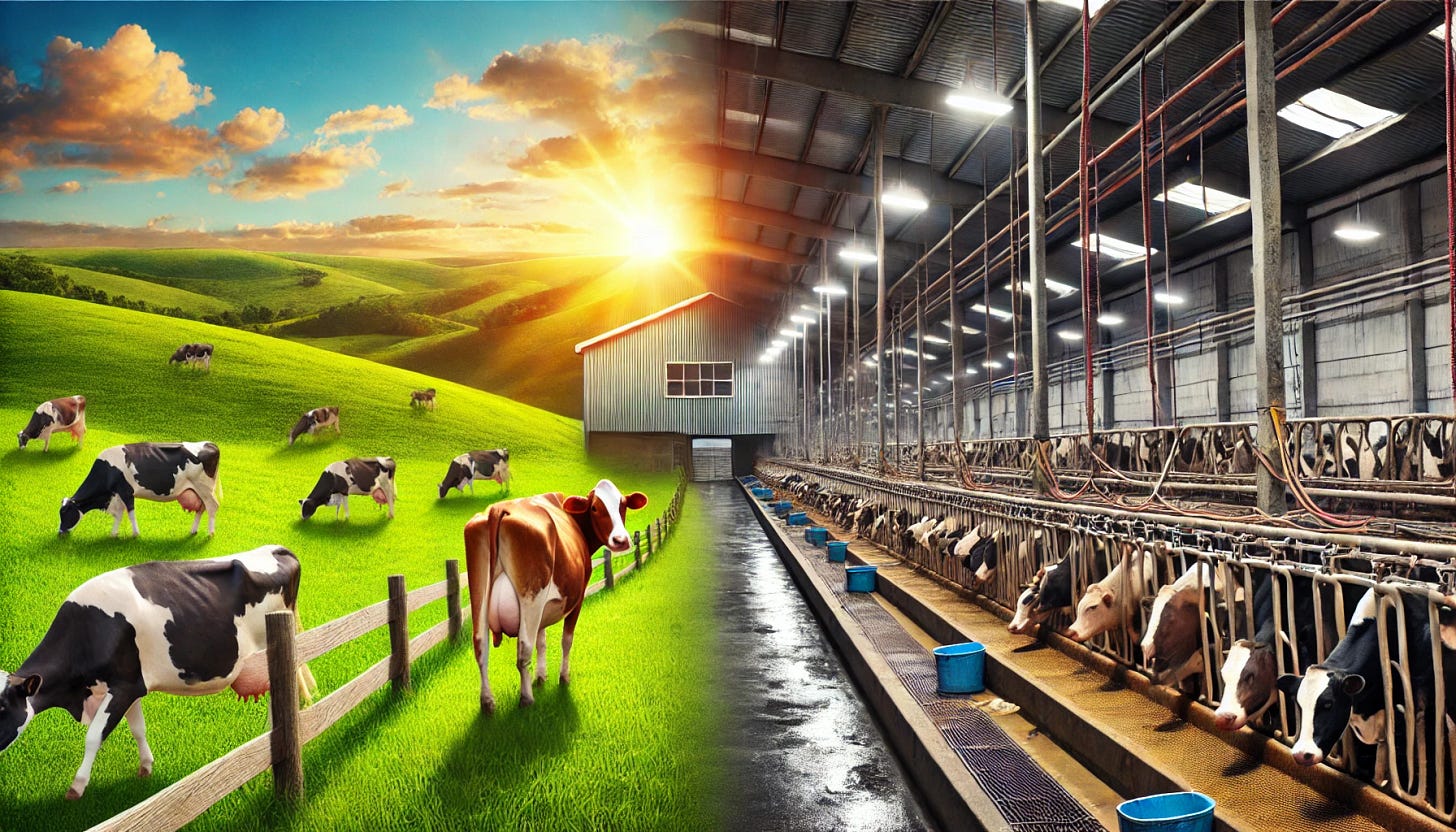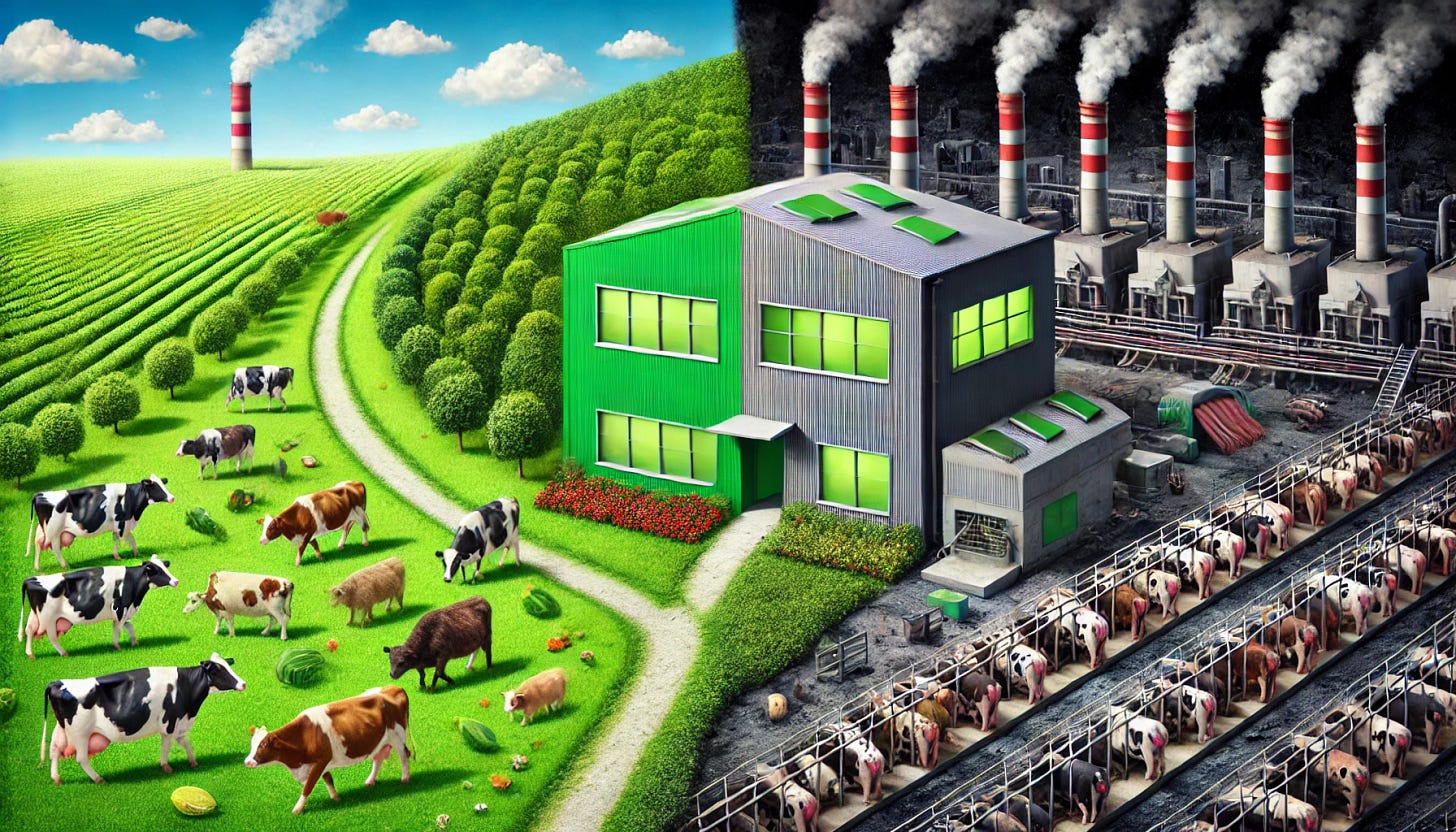
The idyllic images on food packaging—happy cows grazing in open fields, free-roaming chickens, and wholesome family farms—paint a picture of humane and ethical animal agriculture. But how much of this is reality? Across the UK and the US, studies reveal a pattern of systematic misinformation that deceives consumers about the conditions in which meat, dairy, and eggs are produced. The truth is far from what is portrayed in marketing materials, and this deception has serious ethical, environmental, and health consequences.
‘‘The meat, dairy, and egg industries mislead consumers with humane labels, greenwashing, and deceptive supermarket tactics. Factory farming remains hidden behind marketing illusions, masking cruelty and environmental harm. Consumers deserve transparency to make ethical choices—question the labels, demand truth, and consider plant-based alternatives for a better future.’’
The Myth of Humane Farming
Marketing vs. Reality
Buzzwords like “humanely raised,” “cage-free,” and “pasture-raised” are designed to comfort consumers and alleviate guilt, but these labels often mean very little in practice. Many of these claims are unregulated or loosely defined, allowing industrial farms to mislead the public while continuing business as usual. Investigations into so-called humane farms have revealed shocking conditions, including overcrowding, painful mutilations without anesthesia, and severe emotional distress for the animals involved. In the US, brands like Foster Farms and Eggland’s Best have faced legal scrutiny for making misleading welfare claims, despite documented animal cruelty within their supply chains.
Regulatory Shortcomings
Even when regulations exist, they often fall short of protecting animals. A recent report from the Animal Law Foundation found that in the UK, only 2.5% of farms are inspected annually, with just one inspector per 878 farms. Even when violations occur, penalties are rare—less than 1% of non-compliant farms face prosecution. In the US, the USDA allows companies to self-certify humane claims, meaning many farms operate with little to no oversight. As a result, consumers are led to believe they are making ethical choices when, in reality, they are supporting an industry that prioritizes profit over animal welfare.
The Greenwashing of Meat and Dairy
False Environmental Claims
Consumers are not just misled about animal welfare; they are also deceived about the environmental impact of animal agriculture. Many meat and dairy companies market their products as “sustainable” or “carbon-neutral” while continuing to contribute to climate change, deforestation, and water pollution. Tyson Foods, for example, has been sued for misleading consumers with its net-zero emissions pledge despite failing to outline any concrete steps toward achieving this goal.
The Reality of Livestock’s Impact
Animal agriculture is responsible for 14.5% of global greenhouse gas emissions, rivaling all transportation combined.
The industry is a leading cause of deforestation, particularly in the Amazon, where land is cleared to grow animal feed crops like soy.
Manure runoff from factory farms contaminates waterways, leading to the creation of massive dead zones in oceans and rivers.
Despite these realities, companies continue to portray animal agriculture as environmentally friendly, misleading consumers who want to make sustainable choices.

Deceptive Supermarket Tactics
Pushing Meat & Dairy on Consumers
Supermarkets also play a role in perpetuating these myths. A recent Food Foundation study found that UK supermarkets use multi-buy deals to encourage the purchase of processed meats, despite the health risks associated with their consumption. In the US, similar strategies are employed to keep meat and dairy products at the forefront of consumer choices, often at the expense of healthier plant-based alternatives.
Health Risks of Processed Animal Products
The World Health Organization classifies processed meats like bacon, ham, and sausages as carcinogenic, linking them to increased risks of colorectal cancer. Yet, these products continue to be marketed as healthy sources of protein. The lack of transparency about the risks associated with animal products highlights another way in which consumers are misled.
Lawsuits and Consumer Protection Efforts
Several lawsuits have emerged in recent years, challenging the deceptive marketing tactics of the meat, dairy, and egg industries:
Eggland’s Best and Nellie’s Free Range Eggs were sued for falsely claiming that their hens had ample space to roam, despite evidence of overcrowding and confinement.
Tyson Foods faced legal action over its misleading environmental claims.
Oakridge Dairy in Connecticut was forced to remove the claim that its cows were “happy” following public scrutiny and pressure from advocacy groups.
These lawsuits highlight a growing awareness of the deceptive nature of food marketing and a push for greater transparency in labeling.
How Consumers Can Fight Back
Look Beyond Labels
Consumers who want to make ethical choices must look beyond marketing claims and seek out verifiable third-party certifications. However, even the best certifications cannot guarantee a cruelty-free product. The only way to truly ensure ethical consumption is to shift away from animal products altogether.
Demand Transparency
Stronger regulations are needed to prevent misleading advertising in the food industry. Consumers can advocate for change by supporting legislative efforts to enforce stricter labeling laws and hold corporations accountable for false claims.
Consider Plant-Based Alternatives
The rise of plant-based alternatives offers a viable solution for consumers who wish to opt out of an industry built on deception. Modern plant-based meats, dairy substitutes, and egg replacements replicate the taste and texture of animal products without the ethical and environmental costs. Making the switch to a plant-based diet is one of the most effective ways to combat misinformation and support a more just and sustainable food system.
Conclusion: A Wake-Up Call for Consumers
For too long, the meat, dairy, and egg industries have controlled the narrative, crafting an illusion of ethical and sustainable farming while hiding the reality of suffering, environmental destruction, and misleading claims. Consumers deserve the truth. By educating themselves, questioning deceptive marketing, and making more ethical choices, they can challenge the status quo and pave the way for a food system that prioritizes compassion, sustainability, and health.
Visit Our Amazon Store!
All sales of our Vegan Products help promote animal rights worldwide!
General Resources
Books:
Dominion: The Power of Animals in Nature and in Our Imagination by Matthew Scully
Animal Liberation by Peter Singer
Eating Animals by Jonathan Safran Foer
A Billion Hungry Mouths: Feeding the World Without Consuming the Planet by Colin Tudge
Websites and organizations:
Documentaries:
Articles:
"The Case for Animal Rights" by Tom Regan
‘‘Why We Love Dogs, Eat Pigs, and Wear Cows: An Introduction to Carnism’’ by Melanie Joy
‘‘Animal Rights: The Abolitionist Approach’’ by Gary L. Francione
‘‘Fellow Creatures: Our Obligations to the Other Animals’’ by Christine Korsgaard
Seeds of Compassion: Finding Jesus Christ in a Vegan World by Michael Corthell
Receive a single informative article daily at 12:01 AM by email. Explore my homepage with exciting vegan and plant-based news content and delightful and delicious recipes for additional updates. Stay connected to the vegan world and all it has to offer.
Visit The Vegan Project Global our Facebook page for more vegan outreach and education.
Get my new booklet ‘‘25 Vegan Myths Debunked!’’
This concise guide is invaluable for anyone curious about veganism, offering evidence-based insights and practical guidance to navigate vegan living confidently. All proceeds benefit the promotion of animal rights worldwide!
The information on this vegan/plant-based blog is for general informational purposes only. It is not intended as legal, medical, or professional advice. Readers should consult with appropriate professionals for specific advice tailored to their situation. The blog owner is not responsible for any reliance on the information herein.



